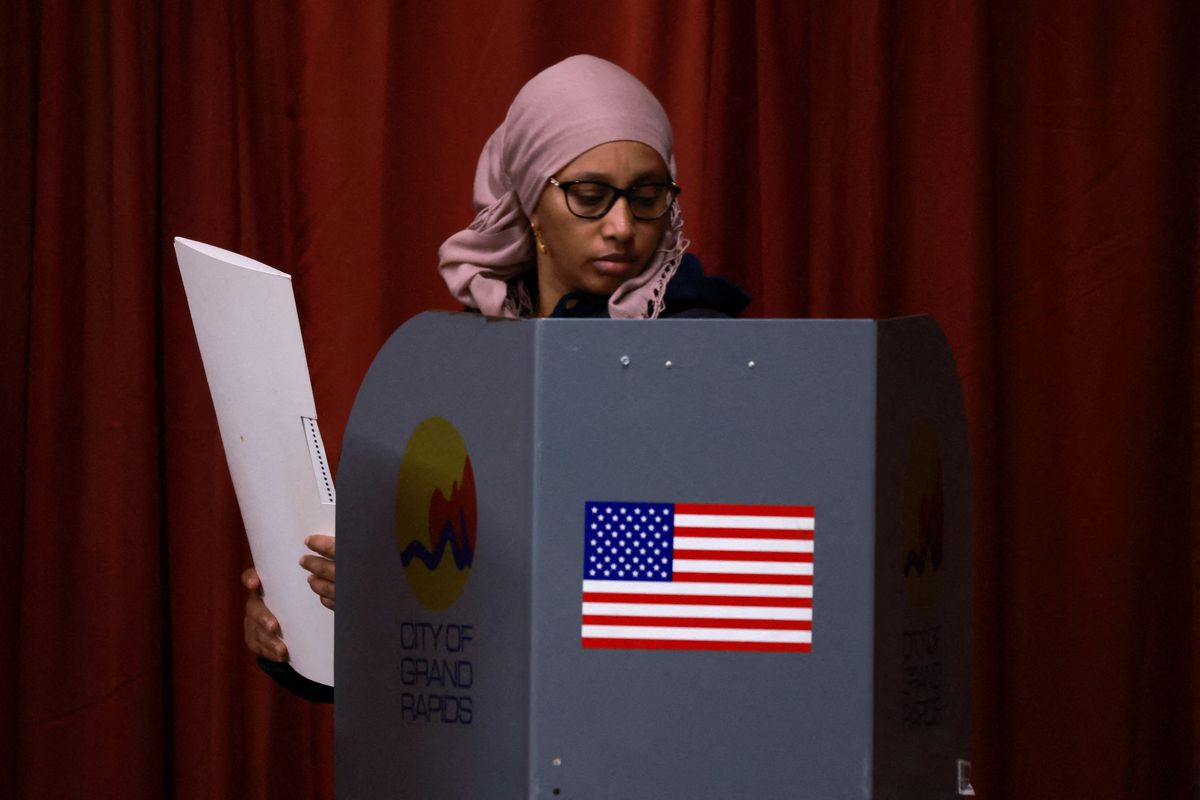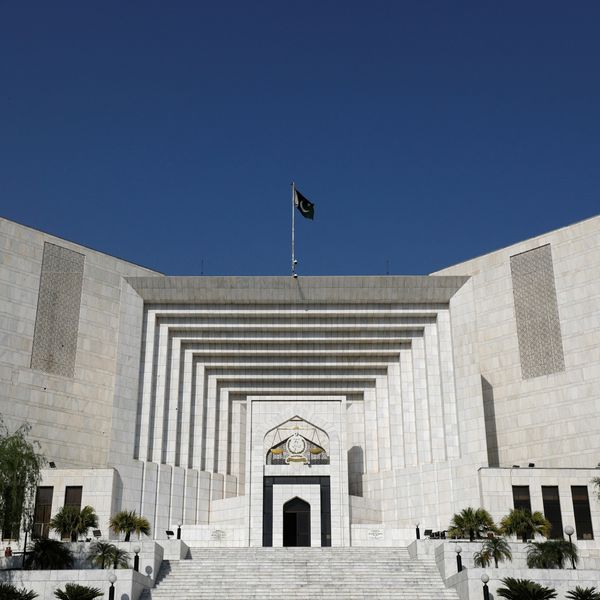Will South Asian voters decide America's next president?
400,000 eligible South Asian voters live in key battleground states

Gaitty Ara Anis
Correspondent-USA
Gaitty Ara Anis is a seasoned multimedia journalist based in Washington, D.C., she specializes in digital content creation, including writing and video production. Currently, she represents Nukta as its correspondent in the USA. She has been previously associated with Voice of America, Dawn, CNBC, PTV World and Geo News over the past twenty years.

Umer Zaib
Senior Producer
Umer Zaib is a Karachi-based journalist and good Samaritan with five years of experience at Pakistan's leading news publications.

A person votes during the 2024 U.S. presidential election on Election Day, at Faith Lutheran Church in Grand Rapids, Michigan, U.S., November 5, 2024.
Reuters
Pakistani American support split, younger voters prefer Harris
61% of Indian Americans support Harris, while 32% back Trump
Some younger voters turning to Green Party's Jill Stein over Gaza
There are close to 400,000 eligible voters of Indian, Pakistani, Afghani, Nepali, Bangladeshi, Nepalese, and Bhutanese descent in America's seven most contested swing states, where in some cases the South Asian electorate now exceeds previous margins of victory.
The community's political engagement has deepened significantly. Indian Americans, the largest South Asian group, saw the highest voter turnout among Asian Americans in the last two presidential elections, matching white voter participation rates. In 2020, 71% of eligible Indian Americans voted, a 9% increase from 2016.
The 5.2 million-strong Indian American community, now the second-largest immigrant bloc in the U.S. after Mexican Americans, finds itself at a crossroads with Kamala Harris, the first person of South Asian descent to lead a major party ticket, vying for the presidency against Donald Trump.
- YouTubewww.youtube.com
Will Indian Americans support her?
Recent polls show Harris maintaining a lead among South Asian voters, though with some erosion compared to traditional Democratic support. A Carnegie Endowment for International Peace survey found that 61% of registered Indian-American voters plan to vote for Harris, while 32% intend to support Trump – a notably greater share for Republicans than in 2020.
The gender dynamics with regards to politics within the community are quite polarized. Among Indian Americans under 40, 62% of women support Harris while just 44% of men do, with 48% of young men preferring Trump. The shift appears driven by various factors, including Trump's friendship with Indian Prime Minister Narendra Modi and concerns about the Biden-Harris administration's stance on Israel's war in Gaza.
However, Harris's candidacy has energized many South Asian voters. Organizations like Indian American Impact and They See Blue report increased volunteer engagement, with postcard-writing campaigns reaching hundreds of thousands of South Asian voters in battleground states.
What about Pakistani Americans?
The Pakistani-American community, numbering about 625,000, presents a more complex picture. While traditionally Democratic-leaning, some Pakistani Americans are showing increased support for Trump, particularly in swing states like Michigan and Pennsylvania. The Pakistani-American Public Affairs Committee's recent endorsement of Trump surprised many, citing potential improvements in Pakistan-U.S. relations and dissatisfaction with the Biden administration's policies.
On the other hand, many Pakistani Americans are still unwilling to take a chance on Trump. "I don't agree with the Republican party and I especially don't agree with Trump and the opinions and views he has, I heavily disagree with them," says Mir Vaiz, a young Pakistani American who spoke to Nukta in Virginia on polling day.
"He wants to run the government like a business. He's a businessman, not a politician, I don't think he should be President."
"This time the election isn't between Democrats and Republicans. It's more like the election is between Democrats and Donald Trump," said Ramiz A Iqbal, speaking to Nukta in Virginia on polling day.
"I was sure I was going to vote Democrat, but the question in my mind was, no matter what we can't let Donald Trump win."
Trump vs. everyone else
Immigration concerns also keep many South Asian Americans in the Democratic camp. "I voted for the Democrats because they support immigrants," Pakistani American immigrant Kamran Rizvi said to Nukta on polling day.
Meanwhile, younger South Asians are charting their own political path. Frustrated with both major parties' stances on issues like Gaza, climate change, and social justice, many are turning to alternatives like the Green Party's Jill Stein.
"I support the Green Party. They [Republicans and Democrats] just want power. They just want control. They don't care about policies at all," explains Aariz, a young Pakistani-American voter, who preferred Stein's progressive platform.







Comments
See what people are discussing